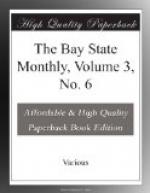“The delightful interchanges of thought between the persons at that dinner are not so important as the fact that transpired toward its close. After the ceremonies of introduction, and the tenders of politeness to Mrs. Frederick W. Seward and Miss Olive Risley—the adopted daughter of the house—the guests who had been received by these ladies moved to the hospitable dining-hall. On the right of Mr. Seward was seated burly English heartiness incarnated in Mr. Anthony Trollope, the novelist. His presence was almost a surprise, if not a satire on the occasion, as it concluded. At the other end of the table sat John J. Crittenden. He was then chairman of Foreign Affairs in the House. The author was on his right, as he was nearer by sympathy to him than others on the committee. He used to say to the writer: ’My young friend, when I was of your age, I did all the work and the older members received the merit marks. You may do the work, sir, and I will take the credit.’ With his grave humor and hearty confidence, he was wont to parcel out to the writer no inconsiderable quantity of the work of this most arduous of committees. Thus it happened that a bill for the relief of the owners of the Perthshire, seized by us, came to the hand of the writer for a report. The chairman was not a little astonished when he found that his subbordinate, on the 17th of December, 1861, was dilating on the Trent case, and quoting Robinson’s Reports to justify the detention of the contraband plenipotentiaries, upon British precedents and conduct.”
From the foregoing selection, it will readily be seen that the author’s style is strong, clear, rapid, and stimulating, his judgment sound and unprejudiced, and his materials authentic. His condition, experiences, and industry combine to throw new light on the events of the most remarkable epoch in natural history, and the volume, independent of Mr. Cox’s reputation, is bound to be a success. It is at once the most picturesque and harmonious political history of our times that has thus far been written, and will, also, be generally looked upon as a solid and substantial contribution to American literature. We feel that we cannot commend it too highly.
* * * * *
In the Century magazine, last spring, Gen. George B. McClellan undertook to present his explanation of the failure of the Army of the Potomac while under his command. In his article, he assaulted the memories of Lincoln and Stanton, and attempted much more than he accomplished,—at least, so thinks the HON. WILLIAM D. KELLEY, who examines McClellan’s statements in a book recently published. It bears the simple title, Lincoln and Stanton.[8] Of this volume, which for the first time makes many fresh disclosures, we hope to have something to say at another time.




